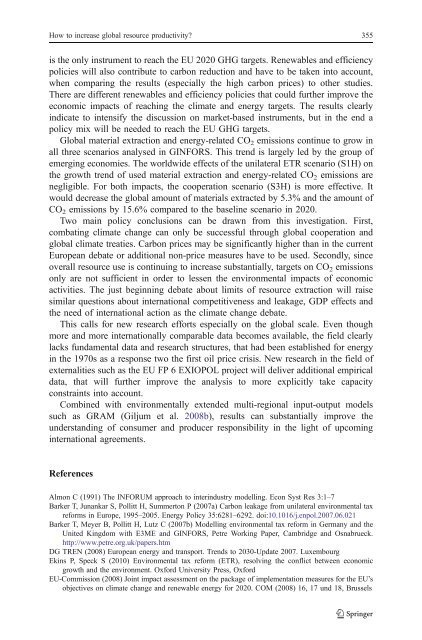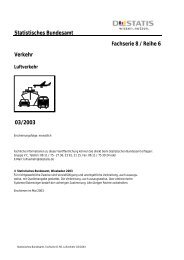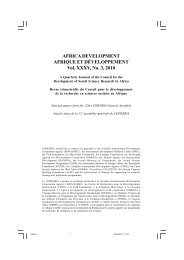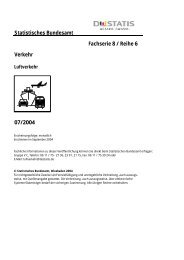The international economics of resources and resource ... - Index of
The international economics of resources and resource ... - Index of
The international economics of resources and resource ... - Index of
You also want an ePaper? Increase the reach of your titles
YUMPU automatically turns print PDFs into web optimized ePapers that Google loves.
How to increase global <strong>resource</strong> productivity? 355<br />
is the only instrument to reach the EU 2020 GHG targets. Renewables <strong>and</strong> efficiency<br />
policies will also contribute to carbon reduction <strong>and</strong> have to be taken into account,<br />
when comparing the results (especially the high carbon prices) to other studies.<br />
<strong>The</strong>re are different renewables <strong>and</strong> efficiency policies that could further improve the<br />
economic impacts <strong>of</strong> reaching the climate <strong>and</strong> energy targets. <strong>The</strong> results clearly<br />
indicate to intensify the discussion on market-based instruments, but in the end a<br />
policy mix will be needed to reach the EU GHG targets.<br />
Global material extraction <strong>and</strong> energy-related CO 2 emissions continue to grow in<br />
all three scenarios analysed in GINFORS. This trend is largely led by the group <strong>of</strong><br />
emerging economies. <strong>The</strong> worldwide effects <strong>of</strong> the unilateral ETR scenario (S1H) on<br />
the growth trend <strong>of</strong> used material extraction <strong>and</strong> energy-related CO2 emissions are<br />
negligible. For both impacts, the cooperation scenario (S3H) is more effective. It<br />
would decrease the global amount <strong>of</strong> materials extracted by 5.3% <strong>and</strong> the amount <strong>of</strong><br />
CO2 emissions by 15.6% compared to the baseline scenario in 2020.<br />
Two main policy conclusions can be drawn from this investigation. First,<br />
combating climate change can only be successful through global cooperation <strong>and</strong><br />
global climate treaties. Carbon prices may be significantly higher than in the current<br />
European debate or additional non-price measures have to be used. Secondly, since<br />
overall <strong>resource</strong> use is continuing to increase substantially, targets on CO2 emissions<br />
only are not sufficient in order to lessen the environmental impacts <strong>of</strong> economic<br />
activities. <strong>The</strong> just beginning debate about limits <strong>of</strong> <strong>resource</strong> extraction will raise<br />
similar questions about <strong>international</strong> competitiveness <strong>and</strong> leakage, GDP effects <strong>and</strong><br />
the need <strong>of</strong> <strong>international</strong> action as the climate change debate.<br />
This calls for new research efforts especially on the global scale. Even though<br />
more <strong>and</strong> more <strong>international</strong>ly comparable data becomes available, the field clearly<br />
lacks fundamental data <strong>and</strong> research structures, that had been established for energy<br />
in the 1970s as a response two the first oil price crisis. New research in the field <strong>of</strong><br />
externalities such as the EU FP 6 EXIOPOL project will deliver additional empirical<br />
data, that will further improve the analysis to more explicitly take capacity<br />
constraints into account.<br />
Combined with environmentally extended multi-regional input-output models<br />
such as GRAM (Giljum et al. 2008b), results can substantially improve the<br />
underst<strong>and</strong>ing <strong>of</strong> consumer <strong>and</strong> producer responsibility in the light <strong>of</strong> upcoming<br />
<strong>international</strong> agreements.<br />
References<br />
Almon C (1991) <strong>The</strong> INFORUM approach to interindustry modelling. Econ Syst Res 3:1–7<br />
Barker T, Junankar S, Pollitt H, Summerton P (2007a) Carbon leakage from unilateral environmental tax<br />
reforms in Europe, 1995–2005. Energy Policy 35:6281–6292. doi:10.1016/j.enpol.2007.06.021<br />
Barker T, Meyer B, Pollitt H, Lutz C (2007b) Modelling environmental tax reform in Germany <strong>and</strong> the<br />
United Kingdom with E3ME <strong>and</strong> GINFORS, Petre Working Paper, Cambridge <strong>and</strong> Osnabrueck.<br />
http://www.petre.org.uk/papers.htm<br />
DG TREN (2008) European energy <strong>and</strong> transport. Trends to 2030-Update 2007. Luxembourg<br />
Ekins P, Speck S (2010) Environmental tax reform (ETR), resolving the conflict between economic<br />
growth <strong>and</strong> the environment. Oxford University Press, Oxford<br />
EU-Commission (2008) Joint impact assessment on the package <strong>of</strong> implementation measures for the EU’s<br />
objectives on climate change <strong>and</strong> renewable energy for 2020. COM (2008) 16, 17 und 18, Brussels








